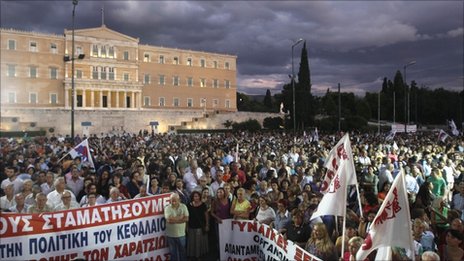 Greece is being hit by a 24-hour public transport strike in the latest protest against government austerity measures.
Greece is being hit by a 24-hour public transport strike in the latest protest against government austerity measures.
Train, bus and taxi services have been crippled and air traffic controllers will stop work for several hours. There will also be a mass protest of public sector workers later in Athens.
The government has toughened its measures, cutting pensions further and suspending more civil servant posts.
It says this must be done to receive a vital 8bn-euro (£6.9bn) tranche of aid.
This is the latest segment of a 110bn euro ($150bn) package of loans established by eurozone countries and the IMF to help Greece pay its huge debts.
The government says its tougher measures are an attempt to secure the continued backing of international creditors and prevent a default on debt payment.
'Sacrificial altar'
The people of Athens were struggling through car-clogged streets on Thursday as the metro, trams, trains, buses and taxis all stopped work.
Flights will be delayed or cancelled by a three-to-four hour walk-out by air traffic controllers in the afternoon.
Some teachers and civil servants also stopped work.
In addition to Thursday's strike, the main private sector union has called for more next month to protest at the austerity measures.
The tougher measures announced on Wednesday affected pensions, tax thresholds and civil servant posts.
Monthly pensions above a 1,200 euro ($1,600) threshold will be cut by 20% and those retiring below the age of 55 will see a 40% cut in pensions over a 1,000 euro threshold.
The number of civil servants suspended on partial pay will rise by 50% to 30,000 by the end of the year.
And the threshold at which income tax becomes payable on annual salaries will drop from 8,000 to 5,000 euros.
Several newspapers on Thursday condemned the measures. The pro-government Ta Nea said pensioners and civil servants had been put on a "sacrificial altar".
The government has also come in for criticism from the business sector as well as workers.
Constantinos Michalos, head of the Athens chamber of commerce and industry, told state TV: "There is no compass, this government doesn't know where it's going."
He later told the BBC: "People are going to revolt for sure - how can you milk a cow when it hasn't been fed?"
Many workers and pensioners are expected to protest in Athens at lunchtime.
Retiree Efthymios Gardikiotis told Associated Press: "I'm 73 years old and I will start a war. The same way [the government] wants a war."
However, not all saw the point in strikes.
One civil servant at the ministry of finance, Georgia Haloulou, told the BBC they would do more harm in the long run.
She said: "Strikes will get us nowhere. The government, any government, has to do the cutbacks because otherwise we won't be able to get the loan; if we don't get the loan, nobody is going to be paid."
The BBC's Mark Lowen in Athens says the government is determined to see off the protests as it must push the austerity measures through to qualify for the next instalment of financial support.
He says the European Central Bank, European Commission and International Monetary Fund have been disappointed at the slow pace of reform and will be back in Greece over the next few days to determine whether Greece will qualify for the aid. Without it, our correspondent says, Greece will effectively go bankrupt.
The president of the European Council, Herman Van Rompuy, insisted a Greek default would be avoided, because the alternative was just too dangerous.
After a six-hour cabinet meeting on Wednesday, government spokesman Elias Mossialos said of the latest measures: "This sends a message to our partners and to the markets that Greece both wishes and is able to fulfil its commitments and remain at the core of the eurozone and the EU."



